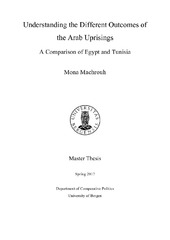Understanding the Different Outcomes of the Arab Uprisings: A Comparison of Egypt and Tunisia
Master thesis
Permanent lenke
https://hdl.handle.net/1956/16012Utgivelsesdato
2017-06-15Metadata
Vis full innførselSamlinger
Sammendrag
This thesis attempts to analyse and explain the reason why Egypt and Tunisia experienced different transitional outcomes following the Arab uprisings in 2011. Although both countries appear to have similar authoritarian regimes, Tunisia experienced a democratic transition while Egypt reverted back to an authoritarian regime. The thesis applies the framework of new institutionalism and rational choice theory in an attempt to explain both structural, and actor-oriented factors that might have contributed to Egypt and Tunisia´s different outcomes. In order to investigate this puzzle, the thesis is based upon the following research question: “Why did Tunisia result in democratization following the Arab uprisings while Egypt did not, when they both appear to have similar authoritarian regimes?” From the theoretical framework thesis has developed three distinct hypotheses. The first two hypotheses are developed from the new institutional approach, and focuses on structural explanations. The third hypothesis is developed from the rational choice approach, and focuses on actor-oriented explanations. In order to explore the hypotheses, the thesis utilizes the strategy of comparative historical analysis and process tracing. The findings indicate that the different outcomes in Egypt and Tunisia mainly lie in influence of the military in relation to the state apparatus. In Egypt, the military and the state apparatus were not autonomous from each other, and instead fused together. As a result of the lack of autonomy between these institutions, a democratic transition has become impossible. By contrast, in Tunisia, the military and state apparatus were autonomous from each other, which in return encouraged a democratic transition. Hence, the autonomy between the state apparatus and the military appears to have been a crucial factor that promotes democratic transitions, whereas a lack of autonomy between these institutions appears to disrupt democratic transitions.
